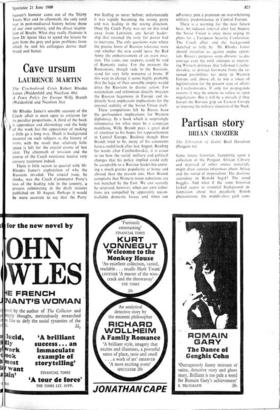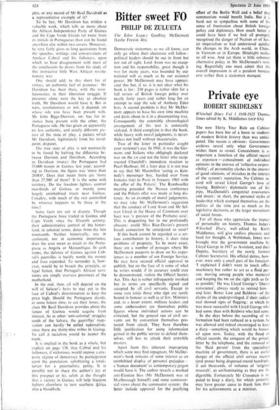Partisan story
BRIAN CROZIER
Some future historian, happening upon a collection of the Penguin African Library and deprived of other source materials, might draw curious inferences about Africa and the sunset of imperialism. The doctrine according to Ronald Segal? The mind boggles. And what if the same historian lacked access to essential background in- formation about that peculiarly British phenomenon, the middle-class guilt com-
plex, or any record of Mr Basil Davidsdi as a representative example of it?
To be fair, Mr Davidson has written a valuable work, which tells us more about the African Independence Party of Guinea and the Cape Verde Islands (or Palm from its initials in Portuguese) than can be found anywhere else within two covers. Moreover, he very fairly gives us long quotations from the speeches, writings and conversations of Amilcar Cabral and his followers, upon which to base disagreement with most of the conclusions he draws from his study of this instructive little West African revolu- tionary war.
One should add, to this short list of virtues, an authentic feel of presence: Mr Davidson has been there, with the revo- lutionaries, in their liberation struggle. If presence alone were the key to absolute truth, Mr Davidson would have it. But in wars, revolutionary or not, it depends on whose side you have been present with. Mr John Biggs-Davison, MP, has for in- stance been present with the other, the Portuguese side. He has given an apparently no less authentic, and totally different pic- ture of the state of play, a picture which Mr Davidson, legitimately from his stand- point, disputes.
The true state of play is not necessarily to be found by halving the difference be- tween Davison and Davidson. According to Davidson (Patcc) the Portuguese had 35,000 troops in Guinea last year; accord- ing to Davison, the figure was 'more than 20,000'. Does that mean there are 'more than 27,500' of them? It is the same with territory. Do the freedom fighters control two-thirds of Guinea, or merely some largely uninhabited tracts near Guinea- Conakry, with much of the rest controlled by whoever happens to be there at the time?
Some facts are not in dispute. Though the Portuguese have traded in Guinea and Cape Verde since the fifteenth century, their administrative control of the hinter- land, in colonial terms, dates from the late nineteenth. Neither historically, nor in sentiment, nor in economic importance, does the area mean as much to the Portu- guese as Angola or Mozambique. In cash terms, the defence of Guinea against Cab- ral's guerrillas is hardly worth the money and lives expended. To surrender it:how- ever, would be to breach the principle, or legal fiction, that Portugal's African terri- tories are simply overseas provinces of the motherland.
In the end, then, all will depend on the will of Salazar's heirs to stay put in the face of Cabral's determination to keep the price high. Should the Portuguese decide. at some future time, to cut their losses, the clues Mr Basil Davidson provides about the future of Guinea would acquire fresh interest. As in other 'anti-colonial' struggles south of the Sahara, the guerrillas' moti- vation can hardly ,'be called nabonalisin, since there are thirty-nine .tribes lit Guinea. To call it racialism would be nearer the mark.
It is implied in the book as a whole, but explicit on page 138, that Cabral and his followers, if victorious, would impose a one- party regime of democracy by participation upon the population, substituting a totali- tarian for a paternalistic polity. It is possible not to share the author's joy at this prospect or his relish at the thought that a victory in Guinea will help freedom fighters elsewhere to turn southern Africa into a bloodbath.







































 Previous page
Previous page